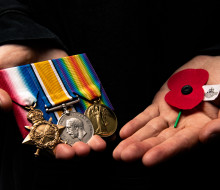
Medals - wearing and caring
19 April 2024
Unfortunately you are viewing this website on an outdated browser which does not support the necessary features for us to provide an adequate experience. Please switch to a modern browser such as latest version of Google Chrome, Mozilla Firefox, Apple Safari or Microsoft Edge.
Ngā mihi nui
Air Marshal Kevin Short has served as the Chief of Defence Force since 2018 and will be leaving the post later this year.
When Chief of Defence Force Air Marshal Kevin Short joined the Air Force four decades ago, the leadership training that new aviators received looked vastly different to today’s learning style.
“Individuals came into the Air Force and they were taught a trade. What we talk about now is life skills, leadership skills, how to communicate, how to work in a team.
“To me it’s giving everyone a full toolset so you can be successful as an individual and be really who you are. The old days it was all about passing courses for a particular trade – so it‘s quite different now.”
Never consciously seeking out leadership roles, AM Short says during the selection process for the Air Force the recruiters must have recognised something in how he interacted with them to recommend an officer’s role, which required the applicant demonstrate leadership, innovation and intellect.
“However, the first 10 years was all about not using any of that, but just doing what I was told. I found that very constraining. As a result I was considered a bit of a mischief-maker in my early days because I was using my ingenuity and initiative in a mischievous way – not necessarily a successful way for my future.
“It wasn’t until I became a Squadron Leader that the responsibility and true leadership and support came through, which was about a decade later.”
Now training focusses on bringing in young, intelligent people to the organisation and keeping them engaged, he says.
During the past six years, one of the biggest challenges in his leadership role has been securing the resources for the Defence Force so it can complete the work that consecutive governments have required.
“I think the Government and Ministers take a while to understand the complexities of the Defence Force. They see us always delivering and because of that, when I say we are under-resourced and need more money, or a capability needs to be replaced, they don’t see it because they see us deliver. It’s to our detriment almost.”
AM Short’s term will likely always be associated with the Defence Force’s response to the Covid pandemic; however he says while Operation Protect was a huge challenge, the pandemic meant there were fewer balls to juggle because business was paused.
“It simplified everything because we couldn’t exercise with our friends and allies overseas, we couldn’t deploy and support other countries. It felt like you had one leg tied, one hand secured and you couldn’t get beyond this tethered state, you couldn’t do what you wanted to do and it went on too long – this feeling of not being able to undertake training or core business. But everyone felt that way.
“I take my hat off to those who served, they did an incredible job over the Covid years in supporting the Government’s needs. Equally though it went on too long and I couldn’t get them out of the role of managing the MIQs because they were doing such a good job and nobody else was setting up a system to replace us.”
A new Chief of Defence will be appointed this year and AM Short had some advice to offer.
“You have to know the whole organisation. In my case I have an Air Force background and I understand that, but you’ve also got to understand how the Army generates its force and how it delivers, you’ve got to do the same with the Navy and you’ve got to get that balance across the whole force.
“You also have to have a really deep belief in the organisation. One of the reasons I enjoy my job so much is I’m still as passionate about the Defence Force, about the Air Force as I was when I joined and that passion and energy comes out in my job – it makes my job so much easier.
“And be patient because things don’t happen as quickly as you think – from a change perspective, or introducing new equipment. So you have to have patience in what you do and that will be reflected throughout the organisation as well.”
AM Short says he has also been lucky with his leadership team. “They give me the confidence and trust that what I do as a leader is going down through the organisation. So you’ve got to have the right leadership team in place supporting you.”